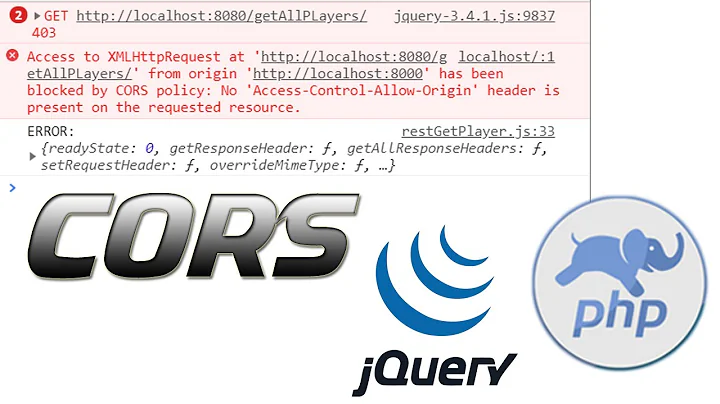Cross-Origin Request Headers(CORS) with PHP headers
Solution 1
Access-Control-Allow-Headers does not allow * as accepted value, see the Mozilla Documentation here.
Instead of the asterisk, you should send the accepted headers (first X-Requested-With as the error says).
Update:
* is now accepted is Access-Control-Allow-Headers.
According to MDN Web Docs 2021:
The value
*only counts as a special wildcard value for requests without credentials (requests without HTTP cookies or HTTP authentication information). In requests with credentials, it is treated as the literal header name*without special semantics. Note that the Authorization header can't be wildcarded and always needs to be listed explicitly.
Solution 2
Handling CORS requests properly is a tad more involved. Here is a function that will respond more fully (and properly).
/**
* An example CORS-compliant method. It will allow any GET, POST, or OPTIONS requests from any
* origin.
*
* In a production environment, you probably want to be more restrictive, but this gives you
* the general idea of what is involved. For the nitty-gritty low-down, read:
*
* - https://developer.mozilla.org/en/HTTP_access_control
* - https://fetch.spec.whatwg.org/#http-cors-protocol
*
*/
function cors() {
// Allow from any origin
if (isset($_SERVER['HTTP_ORIGIN'])) {
// Decide if the origin in $_SERVER['HTTP_ORIGIN'] is one
// you want to allow, and if so:
header("Access-Control-Allow-Origin: {$_SERVER['HTTP_ORIGIN']}");
header('Access-Control-Allow-Credentials: true');
header('Access-Control-Max-Age: 86400'); // cache for 1 day
}
// Access-Control headers are received during OPTIONS requests
if ($_SERVER['REQUEST_METHOD'] == 'OPTIONS') {
if (isset($_SERVER['HTTP_ACCESS_CONTROL_REQUEST_METHOD']))
// may also be using PUT, PATCH, HEAD etc
header("Access-Control-Allow-Methods: GET, POST, OPTIONS");
if (isset($_SERVER['HTTP_ACCESS_CONTROL_REQUEST_HEADERS']))
header("Access-Control-Allow-Headers: {$_SERVER['HTTP_ACCESS_CONTROL_REQUEST_HEADERS']}");
exit(0);
}
echo "You have CORS!";
}
Security Notes
Check the HTTP_ORIGIN header against a list of approved origins.
If the origin isn't approved, then you should deny the request.
Please read the spec.
TL;DR
When a browser wants to execute a cross-site request it first confirms that this is okay with a "pre-flight" request to the URL. By allowing CORS you are telling the browser that responses from this URL can be shared with other domains.
CORS does not protect your server. CORS attempts to protect your users by telling browsers what the restrictions should be on sharing responses with other domains. Normally this kind of sharing is utterly forbidden, so CORS is a way to poke a hole in the browser's normal security policy. These holes should be as small as possible, so always check the HTTP_ORIGIN against some kind of internal list.
There are some dangers here, especially if the data the URL serves up is normally protected. You are effectively allowing browser content that originated on some other server to read (and possibly manipulate) data on your server.
If you are going to use CORS, please read the protocol carefully (it is quite small) and try to understand what you're doing. A reference URL is given in the code sample for that purpose.
Header security
It has been observed that the HTTP_ORIGIN header is insecure, and that is true. In fact, all HTTP headers are insecure to varying meanings of the term. Unless a header includes a verifiable signature/hmac, or the whole conversation is authenticated via TLS, headers are just "something the browser has told me".
In this case, the browser is saying "an object from domain X wants to get a response from this URL. Is that okay?" The point of CORS is to be able to answer, "yes I'll allow that".
Solution 3
I got the same error, and fixed it with the following PHP in my back-end script:
header('Access-Control-Allow-Origin: *');
header('Access-Control-Allow-Methods: GET, POST');
header("Access-Control-Allow-Headers: X-Requested-With");
Solution 4
Many description internet-wide don't mention that specifying Access-Control-Allow-Origin is not enough. Here is a complete example that works for me:
<?php
if ($_SERVER['REQUEST_METHOD'] === 'OPTIONS') {
header('Access-Control-Allow-Origin: *');
header('Access-Control-Allow-Methods: POST, GET, DELETE, PUT, PATCH, OPTIONS');
header('Access-Control-Allow-Headers: token, Content-Type');
header('Access-Control-Max-Age: 1728000');
header('Content-Length: 0');
header('Content-Type: text/plain');
die();
}
header('Access-Control-Allow-Origin: *');
header('Content-Type: application/json');
$ret = [
'result' => 'OK',
];
print json_encode($ret);
Solution 5
I've simply managed to get dropzone and other plugin to work with this fix (angularjs + php backend)
header('Access-Control-Allow-Origin: *');
header("Access-Control-Allow-Credentials: true");
header('Access-Control-Allow-Methods: GET, PUT, POST, DELETE, OPTIONS');
header('Access-Control-Max-Age: 1000');
header('Access-Control-Allow-Headers: Origin, Content-Type, X-Auth-Token , Authorization');
add this in your upload.php or where you would send your request (for example if you have upload.html and you need to attach the files to upload.php, then copy and paste these 4 lines). Also if you're using CORS plugins/addons in chrome/mozilla be sure to toggle them more than one time,in order for CORS to be enabled
Related videos on Youtube
Machavity
Room Owner of Stack Overflow Close Vote Reviewers(SOCVR) Part time contributor to Charcoal and SOBotics Elected moderator on Stack Overflow (2020)
Updated on July 17, 2022Comments
-
 Machavity almost 2 years
Machavity almost 2 yearsI have a simple PHP script that I am attempting a cross-domain CORS request:
<?php header("Access-Control-Allow-Origin: *"); header("Access-Control-Allow-Headers: *"); ...Yet I still get the error:
Request header field
X-Requested-Withis not allowed byAccess-Control-Allow-HeadersAnything I'm missing?
-
 Whats91356Java about 2 years2022 and the top answer really works (on some PHP versions), nice.
Whats91356Java about 2 years2022 and the top answer really works (on some PHP versions), nice.
-
-
Jules almost 12 yearsNote that sending the HTTP Origin value back as the allowed origin will allow anyone to send requests to you with cookies, thus potentially stealing a session from a user who logged into your site then viewed an attacker's page. You either want to send '*' (which will disallow cookies thus preventing session stealing) or the specific domains for which you want the site to work.
-
slashingweapon over 11 yearsAgreed. In practice you probably wouldn't allow just any old domain to use your CORS service, you would restrict it to some set that you decided to trust.
-
 ncubica over 9 yearsFYI, this solution only worked for me in a
ncubica over 9 yearsFYI, this solution only worked for me in aLinux server, inIISfor some reason just didn't work, I dont know if its my hosting or just it's not suitable forIIS -
Roy Calderon about 9 yearsThis solution worked flawlessly in my PHP 5.6.2 at backend, and AngularJS 1.3.12 at frontend.
-
 Renan Franca over 8 yearsThe only that's truly work!.. Just change Access-Control-Allow-Origin: * TO Access-Control-Allow-Origin: {$_SERVER['HTTP_ORIGIN']}
Renan Franca over 8 yearsThe only that's truly work!.. Just change Access-Control-Allow-Origin: * TO Access-Control-Allow-Origin: {$_SERVER['HTTP_ORIGIN']} -
Youstay Igo over 8 yearsThis isn't working for me. Do you have any sample for a working CORS server php script that can be ajax-requested, in working condition on the web? If so, please post the link here. Nothing seems to be working for me :(
-
 DanPride almost 6 yearsTHANKS !! What an absurd waste of time it took to finally find this, and test it like so many other solutions up here, and get the fine surprise "I am done with GD Coors !!
DanPride almost 6 yearsTHANKS !! What an absurd waste of time it took to finally find this, and test it like so many other solutions up here, and get the fine surprise "I am done with GD Coors !! -
 halfpastfour.am over 5 yearsPlease explain why it isn't enough and what minimal example is enough.
halfpastfour.am over 5 yearsPlease explain why it isn't enough and what minimal example is enough. -
Csongor Halmai over 5 yearsUnfortunately, I don't remember exactly and I have no time now to investigate it again but, as much as I remember, there were some basic assumptions from the webserver's/browser's side which made it not working. This was the minimal code that worked for me.
-
AlexKh about 4 yearsGreat solution! Thank you so much!
-
 jub0bs almost 4 yearsBy unconditionally allowing any origin with
jub0bs almost 4 yearsBy unconditionally allowing any origin withACAC: true, you're essentially throwing the Same-Origin Policy out the window. This answer is terrible advice from a security point of view, and it should be downvoted to oblivion. -
dmuensterer over 3 yearsDownvoted for using
$_SERVER['HTTP_ORIGIN']. This is a huge secury risk. -
slashingweapon over 3 yearsIt is true that
$_SERVER['HTTP_ORIGIN]is not "secure" in the sense that your app has no way of verifying the true origin of the request. However, it is the browser's job to protect this header. Your app is not trying to prevent people from various orgs from using it. Rather, your app is confirming to the browser that cross-site requests from certain domains are acceptable at this URL. -
 undefined over 3 yearsAs of 2021, it looks like
undefined over 3 yearsAs of 2021, it looks like*is now accepted as per the MDN docs. -
jumpjack over 3 yearsmy $_SERVER['HTTP_ORIGIN'] is "defined but empty" (???)
-
Rohit Nair about 3 yearsBe careful while using '*' wildcard. Never open it unless that's what you really intend to do. As for testing your angular app specify localhost:4200 and it will work while still being safer.
-
 YazidEF about 3 yearsThis solves my issue - apparently my PHP webservice not able to entertain OPTIONS request properly - on which my Angular front end is relying upon prior to sending the POST request. Thanks!
YazidEF about 3 yearsThis solves my issue - apparently my PHP webservice not able to entertain OPTIONS request properly - on which my Angular front end is relying upon prior to sending the POST request. Thanks! -
 ashutosh almost 3 yearsif already sent in virtul host of apache ..then only this code work ..if ($_SERVER['REQUEST_METHOD'] === 'OPTIONS') { die(); }
ashutosh almost 3 yearsif already sent in virtul host of apache ..then only this code work ..if ($_SERVER['REQUEST_METHOD'] === 'OPTIONS') { die(); } -
jberculo almost 3 yearsBasically what it says here is that it is enough, just not if the request method is 'options'.
-
 jub0bs over 2 yearsShame! Shame! Shame! youtube.com/watch?v=qHhhg1CEJfY&t=22m40s
jub0bs over 2 yearsShame! Shame! Shame! youtube.com/watch?v=qHhhg1CEJfY&t=22m40s -
slashingweapon over 2 yearsYeah, never mind I recommend people actually try to understand this stuff, or warn them about what a big deal it is. He just took the code snippet and presented it as if that were the whole solution. So very clever of him, and very annoying to me. But if it gets people to pay attention to their security when writing CORS headers then it's not all bad.
-
 Yougesh over 2 yearsI have used this in Codeigniter 4.1.3 and it doest work
Yougesh over 2 yearsI have used this in Codeigniter 4.1.3 and it doest work -
 hugob1 over 2 yearsTested on LAMP Server running PHP 7.4.x
hugob1 over 2 yearsTested on LAMP Server running PHP 7.4.x -
Lepy about 2 yearsThis worked really well on VUE + XAMPP (PHP)
-
 Dejell about 2 yearsdo we need to allow Origin header? sounds weird
Dejell about 2 yearsdo we need to allow Origin header? sounds weird -
puntofisso about 2 yearsOf all the StackOverflow answers this is the best.
-
 DistributedAI almost 2 yearsshould these three lines added in top of PHP file ? Like <?php header('Access-Control-Allow-Origin: *'); header('Access-Control-Allow-Methods: GET, POST'); header("Access-Control-Allow-Headers: X-Requested-With");
DistributedAI almost 2 yearsshould these three lines added in top of PHP file ? Like <?php header('Access-Control-Allow-Origin: *'); header('Access-Control-Allow-Methods: GET, POST'); header("Access-Control-Allow-Headers: X-Requested-With");





